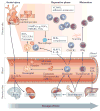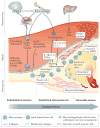Inflammatory processes in cardiovascular disease: a route to targeted therapies
- PMID: 27905474
- PMCID: PMC5525550
- DOI: 10.1038/nrcardio.2016.185
Inflammatory processes in cardiovascular disease: a route to targeted therapies
Erratum in
-
Inflammatory processes in cardiovascular disease: a route to targeted therapies.Nat Rev Cardiol. 2017 May;14(5):314. doi: 10.1038/nrcardio.2017.33. Epub 2017 Mar 16. Nat Rev Cardiol. 2017. PMID: 28300082 No abstract available.
Abstract
Inflammatory processes are firmly established as central to the development and complications of cardiovascular diseases. Elevated levels of inflammatory markers have been shown to be predictive of future cardiovascular events. The specific targeting of these processes in experimental models has been shown to attenuate myocardial and arterial injury, reduce disease progression, and promote healing. However, the translation of these observations and the demonstration of clear efficacy in clinical practice have been disappointing. A major limitation might be that tools currently used to measure 'inflammation' are insufficiently precise and do not provide information about disease site and activity, or discriminate between functionally important activation pathways. The challenge, therefore, is to make measures of inflammation that are more meaningful, and which can guide specific targeted therapies. In this Review, we consider the roles of inflammatory processes in the related pathologies of atherosclerosis and acute myocardial infarction, by providing an evaluation of the known and emerging inflammatory pathways. We highlight contemporary techniques to characterize and quantify inflammation, and consider how they might be used to guide specific treatments. Finally, we discuss emerging opportunities in the field, including their current limitations and challenges that are the focus of ongoing study.
Conflict of interest statement
The authors declare no competing interests.
Figures


Comment in
-
Inflammation: DNases prevent clots formed by neutrophil extracellular traps.Nat Rev Cardiol. 2018 Feb;15(2):69. doi: 10.1038/nrcardio.2017.216. Epub 2017 Dec 21. Nat Rev Cardiol. 2018. PMID: 29263449 No abstract available.
References
-
- Libby P. Inflammation and cardiovascular disease mechanisms. The American journal of clinical nutrition. 2006;83:456S–460S. - PubMed
-
- Biasucci LM, et al. Increasing levels of interleukin (IL)-1Ra and IL-6 during the first 2 days of hospitalization in unstable angina are associated with increased risk of in-hospital coronary events. Circulation. 1999;99:2079–2084. - PubMed
-
- Valgimigli M, et al. Tumor necrosis factor-alpha receptor 1 is a major predictor of mortality and new-onset heart failure in patients with acute myocardial infarction: the Cytokine-Activation and Long-Term Prognosis in Myocardial Infarction (C-ALPHA) study. Circulation. 2005;111:863–870. doi: 10.1161/01.CIR.0000155614.35441.69. - DOI - PubMed
Publication types
MeSH terms
Substances
Grants and funding
LinkOut - more resources
Full Text Sources
Other Literature Sources
Medical

